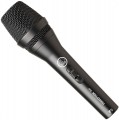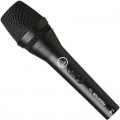The polar pattern of a unidirectional microphone (see above). There are models with
DN switching.
By itself, such a diagram is a graph of sensitivity versus direction, built in the so-called polar coordinate system. For unidirectional models, there are three main options for the shape of the line on such a chart:
—
Cardioid. A chart shaped like an inverted heart symbol (hence the name). Microphones with these characteristics cover a fairly large area in front, which makes it difficult to filter out extraneous sound sources that are close to the main source. At the same time, they are completely insensitive to sound coming from the rear.
—
Supercardioid. These mics have a narrower front coverage than "classic" cardioid mics, making it easier to pick up directional sound. The downside of this is some (albeit rather low) sensitivity to sound coming directly from behind.
—
Hypercardioid. The hypercardioid pattern further narrows the microphone's sensitivity zone in the front (compared to the supercardioid pattern), but widens this zone in the back.
Microphone AC impedance; this parameter is also called "impedance". This is one of the most important characteristics that determines compatibility with the amplifier or other device to which the microphone is connected: if the impedance is not optimal, there may be a loss in signal power. It has its own characteristics, depending on the purpose of a particular model (see above). So, for microphones used with computers, laptops, voice recorders and phones / tablets, the impedance may not be indicated at all — the characteristics of such models are selected in such a way as to ensure normal compatibility with the corresponding devices. But in professional audio equipment, special rules are used for selection; more details can be found in special sources.

